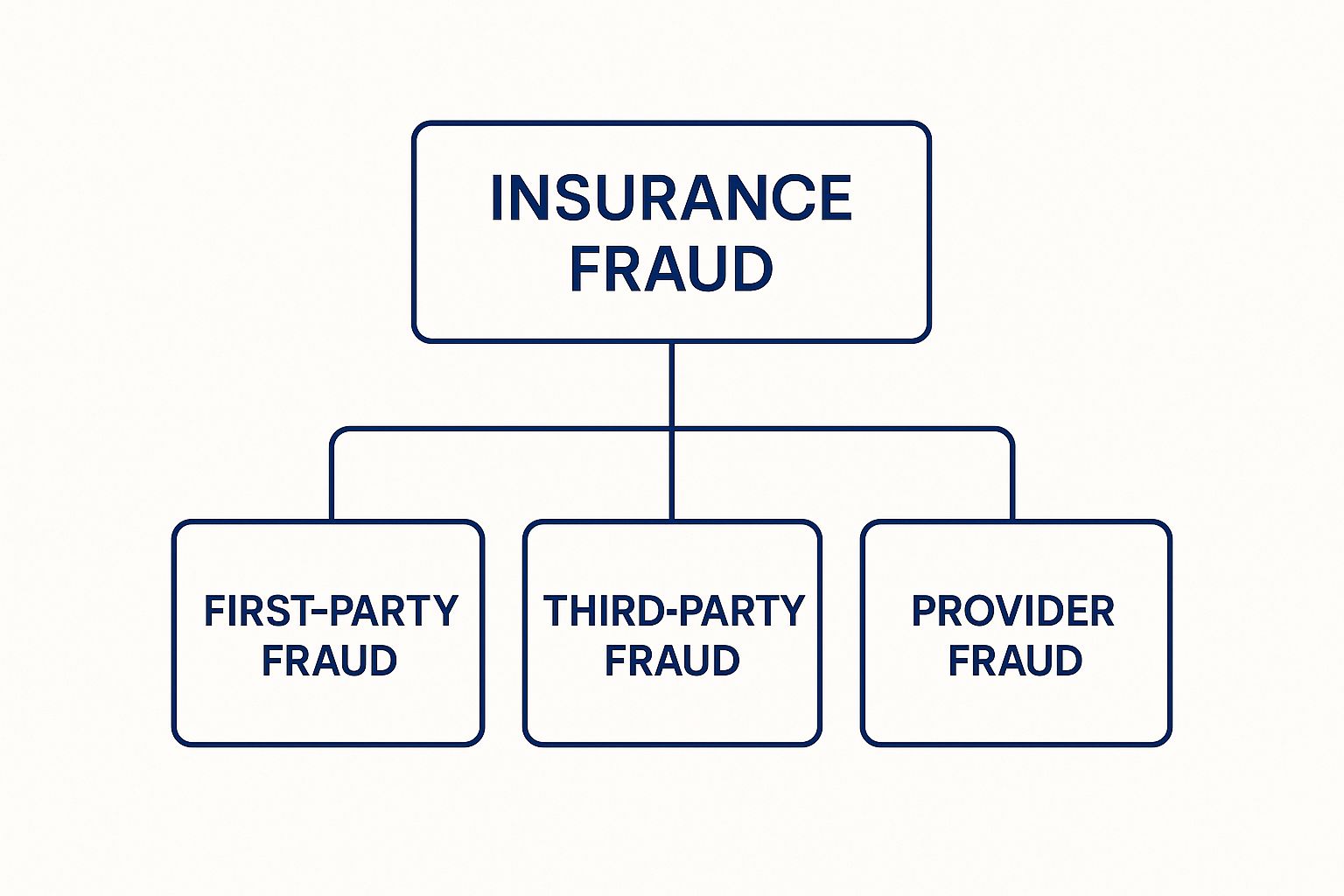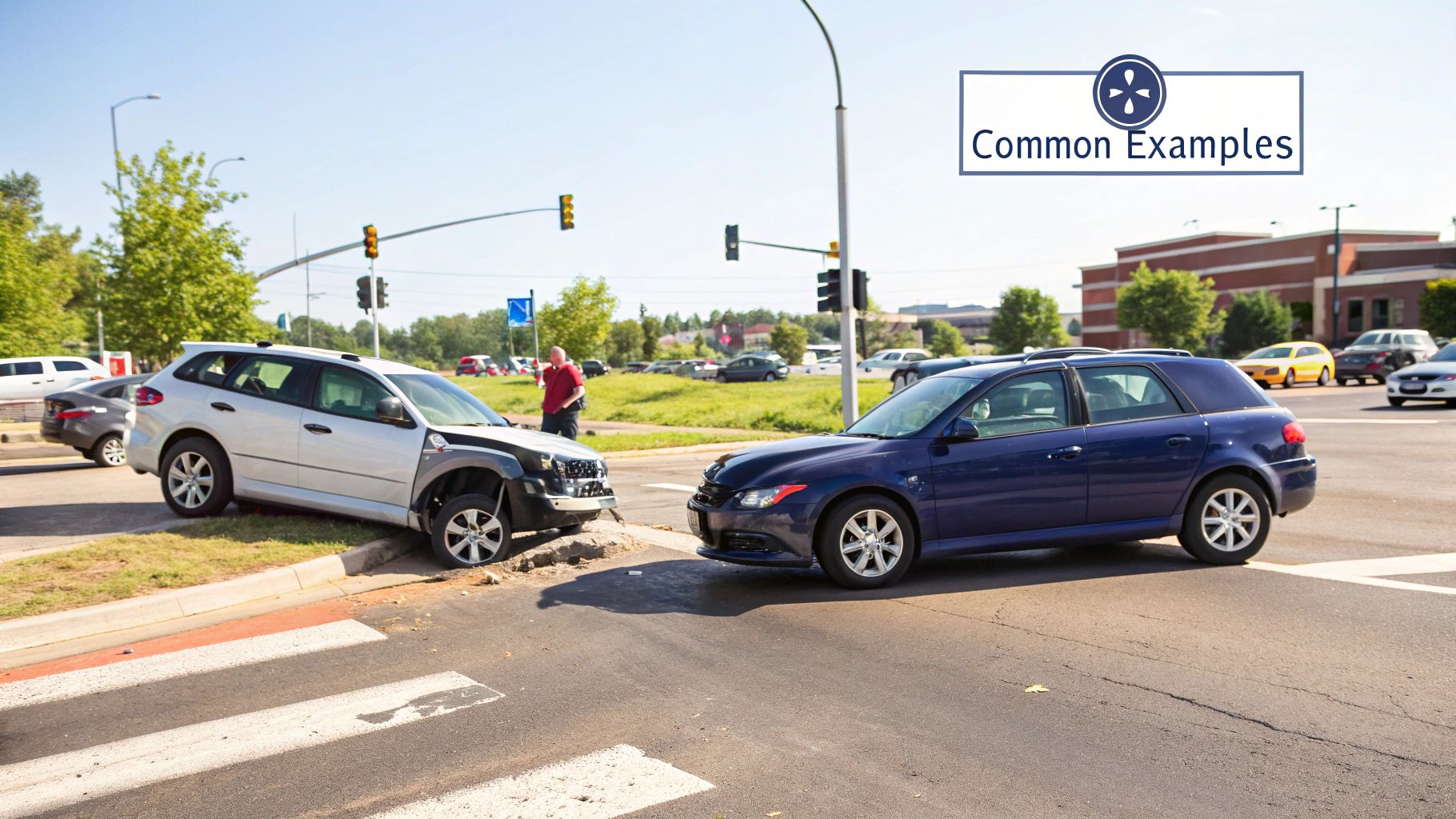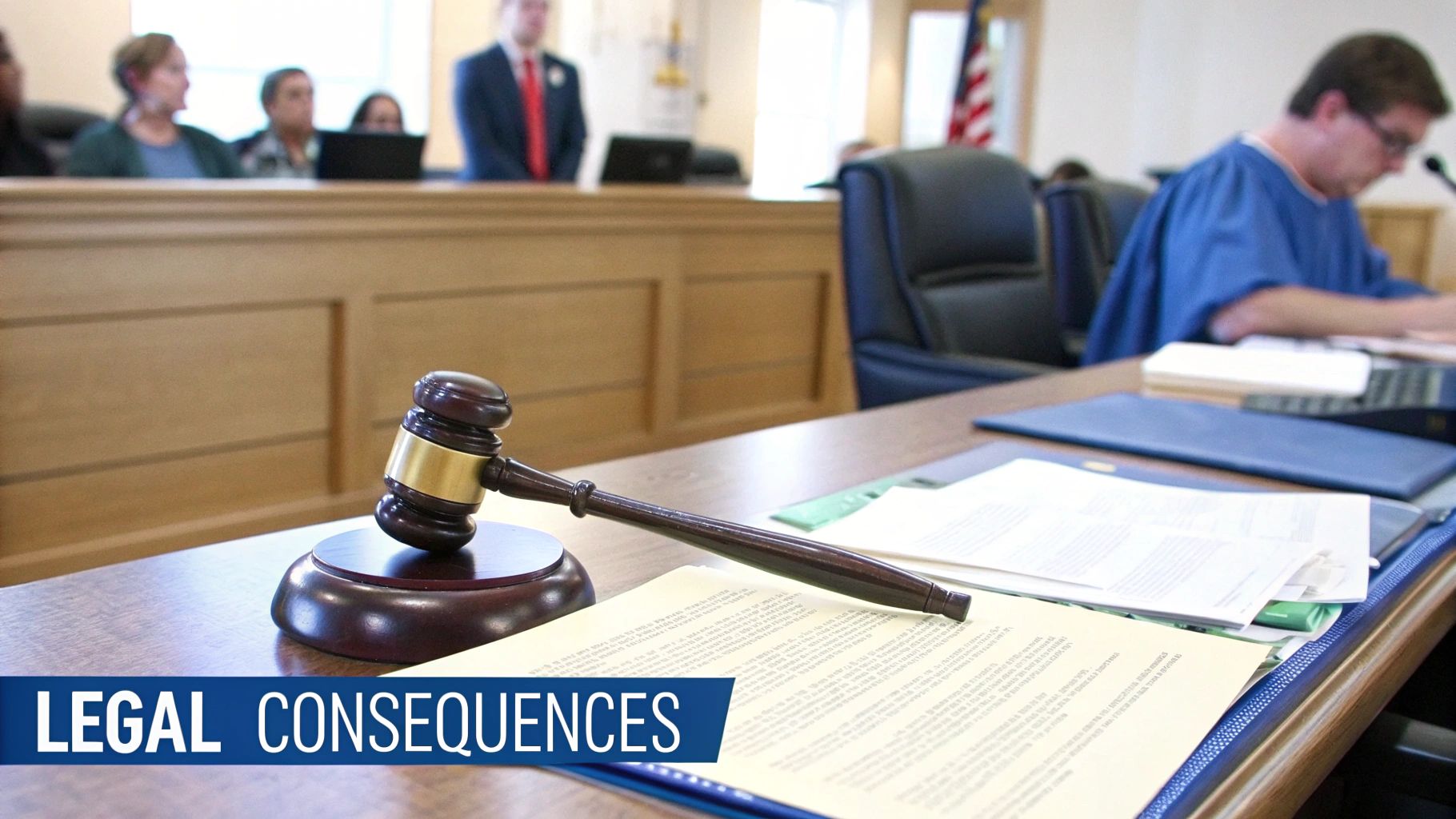What Is Insurance Fraud? Find Out How to Spot It Today
- Showix technical Team
- Jul 10, 2025
- 16 min read
Updated: Jul 26, 2025
Insurance fraud is, at its heart, a deliberate act of deception. It’s when someone intentionally misleads an insurance provider to get money they aren't entitled to. This kind of deceit strikes at the very foundation of trust the entire insurance system is built on.
Decoding Insurance Fraud
The best way to think about insurance is like a community pool of money. We all pay our premiums, contributing to a shared fund. When someone in the community suffers a genuine, unexpected loss – a car crash, a flooded home – they can draw from that fund to get back on their feet.
Insurance fraud is what happens when someone dips into that shared pool dishonestly.
And this isn't a victimless crime. Far from it. When fraudulent claims are paid out, the community fund shrinks. To keep the pool healthy and able to cover future legitimate claims, the insurance company has no choice but to ask for larger contributions from everyone. The result? Honest policyholders end up paying higher premiums to cover the costs of fraud.
Insurance fraud is fundamentally about deception for financial gain. It happens any time an individual or group knowingly provides false or misleading information to an insurance company with the intent to profit from it.
The Two Main Types of Fraud
Most insurance fraud boils down to two main types: "hard fraud" and "soft fraud." Getting your head around the difference is crucial for understanding what's illegal. Hard fraud is a calculated, premeditated act, while soft fraud is more opportunistic – you could call it "stretching the truth."

It's not just the policyholder (first-party) who can commit fraud. It can also involve claimants (third-party) or even the professionals paid to provide a service, like garage mechanics or medical practitioners (provider fraud).
Hard Fraud vs Soft Fraud at a Glance
So, what really separates these two? It all comes down to intent and planning. Hard fraud involves making up an event from scratch, whereas soft fraud involves exaggerating a genuine claim. Both are illegal and come with serious consequences.
This table provides a simple breakdown of the two primary types of insurance fraud, using clear examples to show the key differences in what the person intended to do and how they did it.
Characteristic | Hard Fraud (Deliberate Act) | Soft Fraud (Opportunistic Act) |
|---|---|---|
Nature of Act | A completely fabricated event or loss. | An exaggeration of a genuine, legitimate loss. |
Intent | Premeditated plan to deceive the insurer from the start. | An on-the-spot decision to inflate a real claim. |
Example | Staging a car accident or deliberately setting fire to a property. | Claiming a stolen laptop was a more expensive model than it was. |
While one might seem less severe than the other, it's important to remember that insurers and the law treat both as serious offences. Misrepresenting any detail on a claim for financial gain is, by definition, fraud.
The True Cost of Insurance Fraud for Everyone
It’s tempting to think of insurance fraud as a victimless crime. After all, when someone pulls a fast one on a big insurance company, who really gets hurt? It feels like the money just comes from a huge, faceless corporation. The reality, however, is that the cost lands squarely on your shoulders, and mine.
Think of it like this: your local corner shop has a problem with shoplifting. To make up for the losses, the owner has no choice but to put the prices up. Suddenly, everyone's milk and bread cost a little more. It’s the honest customers who end up paying for the thief's actions.
Insurance works in the exact same way. An insurer manages a big pot of money that we all pay into with our premiums. When a fraudster dips into that pot, the money has to be replaced. The only way to do that? By charging all of us more.
In short, every fake claim that gets paid out makes your own insurance more expensive. It's a crime with millions of victims—every honest person paying a premium.
The Hidden Economic Strain
The damage doesn't stop at higher premiums. Insurance fraud puts a serious strain on our public services and the economy as a whole, creating hidden costs we all bear.
When a claim looks suspicious, it kicks off a chain reaction. It can tie up police officers, clog up the court system, and lead to lengthy legal fights. These are taxpayer-funded resources being pulled away from other urgent needs in our communities. So, the real cost is much bigger than just the money paid out for the fraudulent claim. For a deeper look into the skills involved, our guide on an insurance fraud investigator career breaks it down.
The scale of this problem in the UK is genuinely shocking. Recent figures show that scams cost UK consumers an estimated £11.4 billion in just one year. A huge chunk of this—63% of all identity fraud cases—involves criminals targeting motor insurance, bank accounts, and credit cards. It’s a stark reminder of how interconnected these crimes are and the financial devastation they cause.
Eroding the Foundation of Trust
Beyond the financial hit, insurance fraud chips away at the very trust the system is built on. Insurance is fundamentally an agreement made in good faith. When people lie to get a payout, they break that trust for everyone.
This has real, practical consequences:
More Hassle for Honest People: As fraud rises, insurers have to bring in tougher, slower checks for all claims. This means legitimate customers can face frustrating delays when they genuinely need help.
More Complicated Paperwork: To weed out fraudsters from the start, application forms get longer and more intrusive, making the whole process a headache for everyone.
Higher Running Costs: Insurers have to spend more on clever detection software and bigger investigation teams. Naturally, these extra costs get passed back to us in our premiums.
To really see how much fraud inflates prices, it helps to know what goes into a fair premium in the first place. In niche areas like commercial drone flying, for instance, it’s useful to see what makes up a normal price. There are some excellent guides out there for understanding legitimate drone insurance costs. When you know what should be in the price, the impact of fraud becomes crystal clear.
Common Types of Insurance Fraud Schemes

Insurance fraud isn't a single act; it’s a whole spectrum of deceptive practices. The methods are as varied as the types of insurance you can buy, ranging from small exaggerations on a claim to elaborate, highly organised criminal operations. To really get a handle on what is insurance fraud, you need to see the different forms it takes in the real world.
These schemes often focus on specific insurance products, with criminals finding clever ways to exploit the rules and procedures of each one. Whether it's motor, property, or health insurance, every area has its own set of common tricks that both insurers and the public should know about.
Let's walk through some of the most frequent schemes out there. Knowing what to look for is the first real step in spotting the red flags and protecting both yourself and the integrity of the entire insurance system.
Motor Insurance Fraud
Because of the sheer number of claims and the potential for big payouts, motor insurance is a magnet for fraudsters. The scams can be surprisingly inventive and, disturbingly, often place innocent drivers in genuine danger.
Two of the most well-known types of motor insurance fraud are ‘Crash for Cash’ scams and policy ‘Fronting’.
‘Crash for Cash’ Scams: This is when a criminal deliberately causes an accident. A classic example is a fraudster slamming on their brakes without warning, forcing the innocent driver behind them to rear-end their vehicle. They then submit claims not just for vehicle damage, but also for exaggerated personal injuries and even for "phantom passengers" who weren't in the car at all.
‘Fronting’ Policies: This type of fraud happens right at the application stage. It occurs when a more experienced driver, like a parent, insures a car in their name but lists a younger, high-risk person as only an occasional user. In reality, the younger person is the main driver. This is all done to get a much cheaper premium, but it’s a deception that can make the entire policy worthless if discovered.
The key thing to realise is that motor insurance fraud isn't just about staging accidents. It's also about giving false information to get a better deal. Both are illegal and carry serious consequences.
Property and Home Insurance Fraud
Your home and everything in it can also become a target for insurance fraud, particularly when making claims for theft, loss, or damage. These schemes often blur the lines between "soft fraud" (like exaggerating a claim) and "hard fraud" (making something up entirely).
For example, after a real burglary, a homeowner might feel tempted to add a few expensive items to their claim list – things that were never actually stolen. That's a classic case of soft fraud.
But there are far more serious schemes, too:
Faked Burglaries: This is where a policyholder stages their own break-in. They might break a window or jimmy a door and hide their own possessions to create the illusion of a genuine theft, then file a large claim for the "stolen" goods.
Arson for Profit: In the most extreme cases, people or businesses facing financial ruin might deliberately set fire to their own property. The goal is to collect an insurance payout that's far greater than the property's market value or their outstanding debts. This is one of the most dangerous forms of insurance fraud, putting lives and neighbouring properties at grave risk.
Health and Life Insurance Fraud
Fraud in the health and life insurance world can be committed by policyholders and, more insidiously, by medical providers. These scams directly undermine a system that's supposed to help people when they are ill or after a tragic loss.
For individuals, a common tactic is application fraud. This is where someone deliberately fails to disclose a pre-existing medical condition on a life or critical illness insurance application to secure cover or get a lower price. If the insurer finds out about the lie later on, any claim will almost certainly be denied and the policy cancelled.
Provider fraud is another huge problem. This happens when medical professionals or entire clinics exploit the system for their own financial benefit.
Common Provider Schemes Include:
Phantom Billing: A clinic bills an insurer for medical services, tests, or treatments that were never actually given to the patient.
Up-coding: This is where a provider bills for a more expensive service than the one that was actually performed. For instance, billing a quick, routine check-up as if it were a full, comprehensive consultation.
Unnecessary Procedures: Some unscrupulous providers might perform and bill for medical tests or procedures that a patient doesn't actually need, purely to generate more income from the insurer.
By looking at these different schemes – from a little white lie on an application form to a complex, staged car crash – the broad definition of what is insurance fraud becomes much clearer. At its core, it's any act of deliberate deception intended to get an undeserved payout from an insurer.
Who Commits Insurance Fraud and Why?
When we think of insurance fraud, it’s easy to imagine a sophisticated criminal ring from a blockbuster film. And while organised crime certainly has its place in large-scale scams, the truth about who commits insurance fraud is often much closer to home.
The reality is, it's frequently ordinary people who find themselves in a tight spot and make a bad call. It might be a parent trying to lower the cost of their teenager's car insurance, or a homeowner suddenly facing a mountain of debt. They don't see themselves as criminals. In their eyes, it’s often a "victimless" act against a huge, faceless company.
The Reasons Behind the Lie
To really get to grips with insurance fraud, we need to understand why people do it. The motives are almost always deeply human and tend to fall into a few common buckets.
Financial Pressure: This is probably the biggest driver. An unexpected redundancy, soaring bills, or a medical emergency can push people to a point of desperation. In that moment, tweaking an insurance claim or omitting a detail on an application can feel less like a crime and more like a lifeline.
A Sense of Injustice: Some people feel that insurance companies are out to get them. They see high premiums and hear stories about denied claims, which can foster a sense of resentment. This mindset can make it easy to justify bending the rules, seeing it as "getting their money's worth" or simply levelling the playing field.
Pure Opportunism: This is the classic "soft fraud" scenario. A genuine accident happens—say, a minor dent on a car—but the policyholder sees a chance to get a little extra. They might exaggerate the damage or try to get pre-existing scratches fixed on the same claim. It feels like a small, harmless fib.
Of course, these reasons aren't always separate. More often than not, it's a mix of financial stress and a feeling of justification that leads an otherwise honest person down the wrong path.
A Problem of Perception
A huge part of the problem comes down to a simple lack of awareness, combined with a cultural tendency to normalise "little white lies." Many people just don't realise that what they see as a minor exaggeration is, in fact, fraud with serious consequences.
This is especially true for specific schemes like ‘fronting’ on a car insurance policy. Alarmingly, research shows that less than 40% of people even recognise this as fraudulent. This knowledge gap is a major reason why it’s so common.
The belief that insurance fraud is a victimless crime is one of the most dangerous myths out there. In reality, every fraudulent claim that gets paid out drives up the premiums for all honest policyholders.
Recent studies on UK attitudes are quite revealing. A surprising 17% of UK adults think it’s acceptable to lie on an insurance application. This view is even more prevalent among younger people, with 8% of those aged 25-34 admitting they've already done it. There's also a gender split, with men being more likely than women to see it as acceptable (22% versus 13%).
While individual, opportunistic fraud is widespread, we can't forget about organised operations. These are far more complex, involving groups staging accidents or creating elaborate ghost claims. If this side of things interests you, it's worth learning more about the sophisticated methods used for uncovering corporate fraud.
Ultimately, there is no single "type" of person who commits insurance fraud. It spans everyone from the desperate individual making a one-off mistake to the calculated criminal enterprise. Understanding this human element is the first step in tackling the problem effectively.
How Insurers Detect and Investigate Fraud

Insurance companies aren't just sitting back and waiting for fraudsters to strike. They have a sophisticated, multi-layered system designed to spot deception and protect the honest policyholders who pay their premiums. It’s a smart blend of powerful technology and skilled human intuition, working in tandem to separate genuine claims from the bogus ones. This process kicks into gear the very moment a claim is submitted.
Every single claim is first scanned for what we in the industry call "red flags." These are simply inconsistencies or unusual details that don't quite add up. While one odd detail might not mean anything, a cluster of them will definitely trigger a much closer look.
The Role of Technology in Spotting Patterns
Insurers deal with millions of claims, so it’s physically impossible for people to check every single detail. This is where technology plays a crucial role, acting as an incredibly effective first line of defence. Data analytics and artificial intelligence (AI) are the digital detectives working tirelessly behind the scenes.
These systems are trained to spot subtle patterns that a person might easily miss. They sift through enormous amounts of data from both current and past claims, instantly flagging anything that deviates from the expected norm.
Common Red Flags Pinpointed by Technology:
Multiple Claims From One Address: The system might raise an alert if several unrelated people file claims from the same property in a short space of time.
Links Between Parties: Sophisticated analytics can uncover hidden connections between a claimant, a mechanic, and a medical provider, which could suggest collusion.
Unusual Claim Times: A claim for a car accident at 3 a.m. on a quiet residential street? That will almost certainly be flagged for a manual review.
Claim History: An individual who has a history of making frequent, similar claims is naturally going to attract more scrutiny.
It's important to realise that this technology doesn't make the final call on its own. It acts more like a high-tech filter, funnelling the most suspicious claims to a human expert for a proper investigation.
You can think of it like a really advanced security system. The sensors don't catch the burglar, but they tell the security guard exactly where to go and what to look for.
The Human Element: The Fraud Investigator
Once a claim is flagged as suspicious, it's passed over to a team of specialist fraud investigators. These are the seasoned experts who really dig into the details, methodically piecing together the evidence to find out if fraud has actually taken place.
An investigator’s first move is to meticulously review all the paperwork. This includes the initial report, any photos, medical bills, and repair estimates. They’re hunting for things like forged documents, inflated costs, or stories that contradict each other.
From that starting point, the investigation can branch out in several directions:
Interviews: They'll speak directly with the claimant, any witnesses, and other involved parties to see if their stories are consistent.
Scene Examination: This could involve visiting the site of a supposed accident or burglary to see if the physical evidence actually matches the story being told.
Background Checks: Investigators will look into a claimant's history for any previous fraudulent activities or signs of financial distress that could point to a motive.
Covert Surveillance: In more serious and complex cases, investigators may use surveillance to verify a claim. For example, they might check if someone claiming a debilitating back injury is secretly spending their weekends playing rugby.
The whole process shows how an insurance fraud investigation is an essential guide for claim experts and highlights the meticulous work involved.
Differentiating Mistakes from Deception
A critical part of any investigator's job is telling the difference between a genuine mistake and a deliberate attempt to deceive. Not every error on a claim form is proof of fraud. People forget dates, they mix up details, or they just make honest mistakes, and investigators are trained to spot this. It all comes down to establishing intent.
This challenge isn't just limited to the private insurance world. UK government data on the benefit system shows just how tricky it can be to separate simple errors from outright fraud. While confirmed benefit fraud was around £60 million in a recent year, there was over £2 billion in cases where the evidence was inconclusive. This highlights the huge grey area that investigators navigate.
Ultimately, a fraud case is built on a collection of evidence. A single inconsistency is likely just an error. But a clear pattern of them often points directly towards a calculated attempt to defraud the system, which will always lead to serious consequences.
The Life-Altering Consequences of Getting Caught

Getting caught for insurance fraud isn’t just about having a claim denied. Far from it. The real fallout goes much deeper, creating serious, life-altering problems. The consequences ripple out far beyond a simple financial penalty, hitting your freedom, your future, and your financial stability for years to come.
Many people think the worst that can happen is the insurer simply says "no". That's a huge miscalculation. Once an insurer can prove you deliberately tried to deceive them, they won’t just reject the claim; they'll almost certainly cancel your policy on the spot and prepare to take further action.
This is where the problem starts to snowball, quickly moving from a private insurance matter to a serious legal battle.
The Immediate Legal Fallout
Under UK law, insurance fraud is a criminal offence, and the courts take it very seriously. The penalties aren't a slap on the wrist; they reflect the gravity of the crime and, depending on the scale of the deception, can be severe.
A conviction for fraud can lead to a few different outcomes:
Significant Fines: Courts often impose hefty fines that can be many times more than what you might have hoped to gain.
Community Orders: You could find yourself doing hours of unpaid work in the community as part of your sentence.
Prison Sentences: For more organised and serious cases, like staged ‘crash for cash’ incidents or deliberate arson, a custodial sentence is a very real possibility.
But the immediate legal trouble is just the beginning. The real punishment often comes from the permanent stain it leaves on your record.
A criminal record for fraud is not just a piece of paper; it’s a permanent red flag that follows you everywhere. It can close doors to opportunities you once took for granted, fundamentally changing your future prospects.
A Permanent Blacklist
Perhaps one of the most damaging long-term consequences is being added to an industry-wide fraud database, like the Insurance Fraud Register (IFR). Think of the IFR as a shared blacklist that UK insurers use to track known fraudsters.
Once your name is on that list, getting essential insurance in the future becomes incredibly difficult and eye-wateringly expensive. Insurers will view you as an unacceptable risk. You'll struggle to get affordable cover for your car, home, or business. Many will refuse to cover you at all, while others will quote premiums so high they're impossible to pay. You're effectively locked out of basic financial protection.
This blacklisting, combined with a criminal record, creates a domino effect. It can jeopardise your chances of getting a new job, particularly in fields that require background checks, like finance, law, or security. Even your freedom to travel can be restricted. Countries like the United States and Australia have strict visa rules and often refuse entry to anyone with a history of fraud. The high price of insurance fraud is one you keep paying long after the court case is over.
A Few Common Questions About Insurance Fraud
Let's face it, the world of insurance can be a bit of a minefield. It’s not always clear what’s okay and what crosses a serious line. To help clear things up, here are some straight answers to the questions we hear most often.
Is It Really Fraud if I Just 'Stretch the Truth' on a Claim?
Yes, it absolutely is. Purposefully inflating the value of something that was lost or damaged is a type of insurance fraud called 'soft fraud.'
Think of it this way: someone breaks into your house, which is a legitimate claim. But if you tell your insurer your five-year-old telly was a brand-new, top-of-the-range model to get more money, that’s where you’ve broken the law. It might feel like a minor white lie, but it’s a deliberate deception that can land you in serious trouble.
The key thing here is intent. We all make honest mistakes when trying to remember the exact value of our belongings. But there's a world of difference between a genuine guess and a calculated lie designed to get a bigger payout. Insurers and the legal system are very good at spotting which is which.
What Should I Do if I Think Someone Is Committing Fraud?
If you have a gut feeling that someone is committing insurance fraud, the right thing to do is report it. If you know which insurance company is involved, you can contact them directly.
A better option is to report it completely anonymously to the Insurance Fraud Bureau (IFB). They have a dedicated service called the Cheatline just for this purpose. Reporting fraud isn't just about one person; it helps keep the entire system fair and prevents premiums from rising for everyone else.
Can I Get into Trouble for an Honest Mistake?
No, you won't get into trouble for a genuine mistake. Insurers understand that people aren't perfect. There’s a clear legal line between an accidental error and a deliberate attempt to deceive for financial gain.
For instance, if you get a detail wrong on an application form by mistake, it will likely just mean your policy or premium gets adjusted once the error is fixed. The crucial element is that there was no intent to mislead. As long as you aim to be completely honest with your insurer, you’ll be fine.
If your business is struggling with suspicious claims or needs a discreet way to get to the bottom of things, Sentry Private Investigators Ltd is here to help. Our experienced teams offer professional investigation services to protect your bottom line. Find out more about our corporate investigation services.





Comments